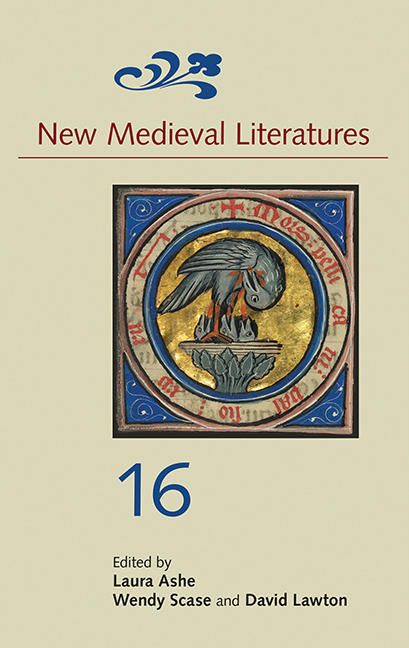Book contents
- Frontmatter
- Contents
- 1 The Book of the World at an Anglo- Norman Court: The Bestiaire de Philippe de Thaon as a Theological Performance
- 2 Monks, Money, and the End of Old English
- 3 Sustainability Romance: Havelok the Dane's Political Ecology
- 4 Locating the Border: Britain and the Welsh Marches in Fouke le Fitz Waryn
- 5 From disputatio to predicatio – and back again: Dialectic, Authority and Epistemology between the Roman de la Rose and the Pèlerinage de Vie Humaine
- 6 Mixed Feelings in the Middle English Charlemagne Romances: Emotional Reconfiguration and the Failures of Crusading Practices in the Otuel Texts
- 7 Circularity and Linearity: The Idea of the Lyric and the Idea of the Book in the Cent Ballades of Jean le Seneschal
- 8 ‘What shal I calle thee? What is thy name?’: Thomas Hoccleve and the Making of ‘Chaucer’
6 - Mixed Feelings in the Middle English Charlemagne Romances: Emotional Reconfiguration and the Failures of Crusading Practices in the Otuel Texts
Published online by Cambridge University Press: 05 July 2016
- Frontmatter
- Contents
- 1 The Book of the World at an Anglo- Norman Court: The Bestiaire de Philippe de Thaon as a Theological Performance
- 2 Monks, Money, and the End of Old English
- 3 Sustainability Romance: Havelok the Dane's Political Ecology
- 4 Locating the Border: Britain and the Welsh Marches in Fouke le Fitz Waryn
- 5 From disputatio to predicatio – and back again: Dialectic, Authority and Epistemology between the Roman de la Rose and the Pèlerinage de Vie Humaine
- 6 Mixed Feelings in the Middle English Charlemagne Romances: Emotional Reconfiguration and the Failures of Crusading Practices in the Otuel Texts
- 7 Circularity and Linearity: The Idea of the Lyric and the Idea of the Book in the Cent Ballades of Jean le Seneschal
- 8 ‘What shal I calle thee? What is thy name?’: Thomas Hoccleve and the Making of ‘Chaucer’
Summary
The fourteenth and fifteenth centuries witnessed the emergence and circulation in England of a significant corpus of Middle English romances in which Christians engage in holy warfare against Saracen opponents. Scholarly research on these texts, while gaining momentum of late, has largely confined itself to an examination of the ways in which the crusade allowed for the articulation of discourses of nationhood, race, religious unity, and collective identity, established and crystallized by pitting Christian or specifically English protagonists against figures of ‘alterity’. The engagement of these texts with crusading history and ideology as such is far less frequently considered, in part because the failure to launch a large- scale crusading expedition to recover the Holy Land after the fall of Acre in 1291 was for a long time misconstrued as testifying to ideological decline. An ever- expanding number of publications on late medieval crusading, unanimous in adhering to a pluralist definition of the crusades, have however disproved this assumption, documenting the enduring vitality of the enterprise throughout the fourteenth and fifteenth centuries. Accordingly, the few studies which have in fact commented on the relation between these romances and crusading history and mindset have generally situated them within a framework of militant aspiration and/or propaganda. Yet, while crusading persisted as a dynamic set of activities and beliefs during this period, it is misleading to define the attitude of late medieval society towards the enterprise as one of undivided appeal and support or disillusion: crusading, as attested by a variety of sources, prompted a diversity of responses, ranging from emphatic zeal to dissatisfaction and objection. Doubt, scepticism, and critique ran alongside the advocation of the redemptive and meritorious aspects involved. My interest in this article is to illustrate some of the ways in which this mixture of enthusiasm and reservation is reflected in the popular literature of the time, finding expression within these narratives in the language of emotions. Indeed, a close examination of the ways in which emotions are employed to define actions or characters in these texts provides valuable insight into the motives and mindsets involved in their composition and reproduction, into the responses they aimed to generate, and into the anxieties and doubts they carry.
- Type
- Chapter
- Information
- New Medieval Literatures , pp. 172 - 212Publisher: Boydell & BrewerPrint publication year: 2016



